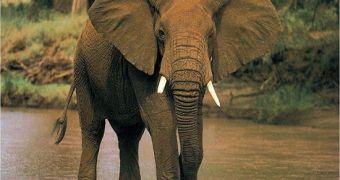Earlier this month, the news broke that some 40 elephants in Zimbabwe's Hwange National Park lost their lives after drinking poisoned water. Recent information says that, over the couple of weeks, other several dozen elephants in the region died in the same manner.
Local authorities explain that, according to evidence at hand, poaches are the ones to blame for these animals' tragic death.
Thus, they say that, rather than using guns to kill the elephants in order to strip them of their tusks, local poachers opted for pouring cyanide in their watering holes.
Besides, they also poisoned salty ground that these elephants lick on a fairly regular basis in order to up their intake of nutrients.
“Industrial cyanide used in gold mining was put in remote water holes and on salty ground that the elephants like to lick after drinking the water,” Caroline Washaya-Moyo, a spokesperson for the Hwange National Park told the press, as cited by Nature World News.
All in all, about 87 such animals ingested cyanide and passed away shortly after. Their corpses were found by wildlife rangers who say that, after their death, all of the animals had their tusks removed by poachers.
“The poison was killing them and they were taking the tusks,” Caroline Washaya-Moyo further explained.
According to The Inquisitr, nine people have thus far been arrested by local authorities in Zimbabwe on suspicion that they helped poison the elephants' watering holes and the salty ground.
Police officers are still investigating the case, so it is likely that more arrests will follow.
The same source tells us that, until now, just 51 of the tusks taken from these animals have been recovered. Authorities promise to do their best to recover all 174 of them.
Conservationists say that, although the poachers only targeted elephants, the fact remains that, by poisoning the watering holes, they've put hundreds of other animals living in the region in danger.
“This kind of indiscriminate killing is truly horrendous. By poisoning a watering hole, poachers condemn every other animal feeding in that vicinity – from lions and leopards to vultures and bird life,” stated Drew McVey with the World Wildlife Fund.

 14 DAY TRIAL //
14 DAY TRIAL //